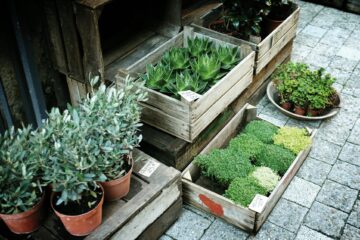Gardening is not only a pleasurable hobby but also an opportunity to contribute positively to the environment. By practicing eco-friendly gardening techniques, you can create a sustainable garden that conserves resources, minimises waste, and promotes biodiversity. In this article, we will explore tips on reducing water usage, minimising waste, and using sustainable materials to help you cultivate an environmentally friendly garden.
Reducing Water Usage
Water conservation is crucial in gardening, especially in regions prone to droughts or experiencing water scarcity. By using water wisely, you can maintain a healthy garden while reducing your environmental impact. Here are some tips on how to reduce water usage in your garden:
- Water Efficiently: Water your garden early in the morning or late in the evening to reduce evaporation. Use a soaker hose or drip irrigation system to deliver water directly to the roots where it is needed most.
- Mulch: Mulching helps retain moisture in the soil, reducing the need for frequent watering. Organic mulches like straw, wood chips, or compost not only conserve water but also improve soil fertility.
- Choose Drought-Resistant Plants: Select plants that are well-adapted to your climate and require less water to thrive. Native plants are typically more drought-resistant and support local wildlife.
- Collect Rainwater: Install a rain barrel to collect rainwater for irrigation. Rainwater is free from chlorine and fluoride, making it an excellent natural source of water for your garden.
- Group Plants by Watering Needs: Create water-efficient zones in your garden by grouping plants with similar water requirements together. This way, you can avoid overwatering some plants while under-watering others.
Minimising Waste in your Sustainable Garden
Reducing waste in your garden not only benefits the environment but also saves you time and money. By practicing sustainable gardening techniques, you can minimise waste and create a more efficient and productive garden. Here are some tips on how to minimise waste in your garden:
- Compost: Instead of throwing away kitchen scraps and garden waste, compost them to create nutrient-rich soil amendments for your garden. Composting reduces landfill waste and improves soil health.
- Use Smart Planting Practices: Avoid overcrowding plants to prevent competition for resources and reduce the risk of diseases. Proper spacing and planting in succession can maximize yield and minimize waste.
- Choose Long-Lasting Tools: Invest in high-quality gardening tools made from durable materials. By choosing tools that last longer, you can reduce the amount of waste generated from broken or disposable tools.
- Repurpose Materials: Get creative with repurposing materials in your garden. Use old containers as planters, repurpose wooden pallets for raised beds, or turn broken pots into garden decorations.
- Avoid Chemical Fertilizers and Pesticides: Chemical fertilisers and pesticides can have harmful effects on the environment and wildlife. Opt for natural fertilisers like compost and use companion planting and biological pest control methods to manage pests organically.
Using Sustainable Materials
Using sustainable materials in your garden is essential for reducing your ecological footprint and creating a more harmonious garden ecosystem. By choosing eco-friendly materials, you can support environmental conservation efforts and promote biodiversity. Here are some tips on how to use sustainable materials in your garden:
- Recycled and Reclaimed Materials: Incorporate recycled or reclaimed materials into your garden design. Use reclaimed wood for raised beds, recycled glass for garden decorations, or recycled plastic for edging.
- Biodegradable Plant Pots: Opt for biodegradable plant pots made from materials like coconut coir, peat, or bamboo. These pots break down naturally over time, reducing plastic waste in landfills.
- Natural Stone and Gravel: Use natural stone and gravel for pathways, patios, and decorative elements in your garden. Natural stone is durable, low maintenance, and adds a touch of elegance to your outdoor space.
- Organic Garden Supplies: Choose organic soil amendments, fertilisers, and pest control products to maintain a healthy garden ecosystem. Organic products promote soil fertility, support beneficial microorganisms, and protect pollinators.
- Sustainable Garden Structures: Build garden structures, such as trellises, arbors, and pergolas, using sustainable materials like bamboo, FSC-certified wood, or recycled metal. These structures not only enhance the aesthetics of your garden but also have a lower environmental impact.
In conclusion, eco-friendly gardening is a rewarding endeavour that benefits both your garden and the planet. By implementing water-saving techniques, minimising waste, and using sustainable materials in your garden, you can create a beautiful and sustainable outdoor space that promotes biodiversity and conserves resources. Start small by incorporating some of these tips into your gardening practices, and watch your garden thrive in harmony with nature. Let’s cultivate a greener future, one garden at a time.
Keep on top of your gardening with our free online journal
Our free online tool allows you to organise your ideas and garden plans and help you be as efficient as possible in the garden.
Sign up now

